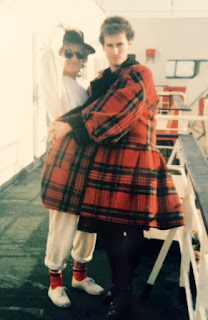Yoruba carved wooden figure
I.
As everyone knows, many European artists at the beginning of the twentieth-century were inspired by the aesthetics of traditional African sculpture and, without understanding anything of the original symbolism and function of the works, they cheerfully appropriated numerous elements into their own projects in an attempt to move beyond the naturalism that had defined (and limited) Western art since the Renaissance.
Soon, anyone and everyone who wanted to be thought of as avant-garde, began to purchase African figures and masks and to rave about the aesthetic and spiritual value to be found in primitivism. So, it's not surprising that when Birkin and Gerald stay with Julius Halliday and his bohemian friends at a flat in Soho there were "several negro statues, wood-carvings from West Africa" [74] on display.
Gerald finds the pieces strange and disturbing; particularly the figure of a woman sitting naked in a contorted posture (possibly giving birth), which he describes as obscene. The next morning, still troubled by the work, he asks his friend Rupert for his views on it:
"Birkin, white and strangely present, went over to the carved figure of the negro woman in labour. Her nude, protuberant body crouched in a strange, clutching posture, her hands gripping the ends of the band, above her breast.
'It is art,' said Birkin."
[78]
Gerald re-examines the figure. But somehow - and for some reason - it made his heart contract:
"He saw vividly, with his spirit, the grey, forward-stretching face of the negro woman, African and tense, abstracted in utter physical stress, It was a terrible face, void, peaked, abstracted almost into meaningless by the weight of sensation beneath. [...]
'Why is it art?' Gerald asked, shocked, resentful.
'It conveys a complete truth,' said Birkin. 'It contains the whole truth of that state, whatever you feel about it.'
'But you can't call it high art,' said Gerald.
'High! There are centuries and hundreds of centuries of development [...] behind that carving; it is an awful pitch of culture, of a definite sort.'
'What culture?' Gerald asked, in opposition. He hated the sheer African thing.
'Pure culture in sensation, culture in the physical consciousness, really ultimate physical consciousness, mindless, utterly sensual. It is so sensual as to be final, supreme.
But Gerald resented it. He wanted to keep certain illusions, certain ideas like clothing.
'You like the wrong things, Rupert,' he said, 'things against yourself.'"
'Oh, I know, this isn't everything,'" Birkin replied, moving away. [79]
Although he doesn't let on here, Birkin is perhaps even more perturbed by the female figure than Gerald. Thus it is that, twelve chapters later in the novel, when suddenly recalling the African fetishes he had encountered at Halliday's flat:
"There came back to him one, a statuette about two feet high, a tall, slim, elegant figure from West Africa, in dark wood, glossy and suave. It was a woman, with hair dressed high, like a melon-shaped dome. He remembered her vividly: she was one of his soul's intimates. Her body was long and elegant, her face was crushed tiny like a beetle's, she had rows of round heavy collars, like a column of quoits, on her neck. He remembered her: her astonishing cultured elegance, her diminished beetle face, the astounding long elegant body, on short, ugly legs, with such protuberant buttocks, so weighty and unexpected below her slim long loins. She knew what he himself did not know. She had thousands of years of purely sensual, purely unspiritual knowledge behind her." [253]
This passage - along with the earlier exchange between Birkin and Gerald - can only be understood in relation to the question of racial (and racialised) aesthetics ...
II.
We can, I suppose, take it as a given that there is a dynamic between race and aesthetics and that one of the privileges of having a white skin is that you get to determine what is (and is not) objectively beautiful and that on the basis of this determination white people can also justify the denigration of black art and culture - and, indeed, black people - as ugly and inherently inferior.
But the paradoxical thing, of course, is that white people also find blackness threatening and sexually provocative (something keenly exploited by pornographers). They might not wish to accept people of colour as their social, political, and cultural equals, but they are happy to indulge in exoticism and attribute extraordinary qualities to other races - often by virtue of their physical features - which makes them alluring.
I think we can find aspects of all these things - the normative component of (white) aesthetics and the attempt to imbue beauty with racial meaning, the overt racism and often unconscious bias of white people unaware of their own privilege, the sexual stereotyping and objectification of black bodies, etc. - in the passages quoted above from Women in Love.
Gerald is shocked to hear Birkin describe the African statuette as a work of art and point out that it has thousands of years of culture behind it. He cannot accept this: for him, art - certainly high art - and culture (which he associates with clothing and illusion) belongs exclusively to the white world. Gerald hates the pure African thing and seems to regard Birkin as something of a race traitor for liking the wrong things - things that are non-white and non-Western.
Almost, one is tempted to describe Gerald as a negrophobe; i.e., someone gripped by a fear and/or hatred for black people and black culture - a condition that if not rooted in the ideology of white aesthetics, is certainly reinforced by it. For Gerald, whiteness and blackness transcend mere skin tones or even aesthetic qualites; they have moral and metaphysical significance.*
But then the same is also true of Birkin. Indeed, Birkin has an entire philosophy worked out in terms of race and two contrasting forms of
abstraction (which seems to be his word for a fatal form of racial consummation):
"The white races, having the arctic north behind them, the vast abstraction of ice and snow, would fulfil a mystery of ice-destructive knowledge, snow-abstract annihilation. Whereas the West Africans, controlled by the burning death-abstraction of the Sahara, had been fulfilled in sun-destruction, the putresecent mystery of sun-rays."
[254]
This is the kind of thing one only finds in Lawrence - and Nazi occultism. But Birkin's main interest in the African statuette, however, is more erotic than esoteric; he finds the female figure extremely elegant and
utterly sensual and when he remembers her he does so vividly: she was, we are told,
one of his soul's intimates. Does that mean Birkin has a black soul? Or does it mean, rather, that he fetishises black female beauty? Probably the latter, I would suggest.
In other words, rather than stigmatise the racial features of African women as deviating from the accepted standard of white beauty, he indulges in a little racial exoticism and pervs on their hair styles, their faces, and their bodies, particularly the
protuberant buttocks and
slim long loins.
Now, some people might suggest that's better than Gerald's overt negrophobia - but really it's just the other side of the same coin and it's worth noting that whilst Birkin may seceretly lust after black women, he marries snow white Ursula Brangwen and continues to move in all white circles. One suspects that, push comes to shove, he might even share the view expressed by Oliver Mellors; i.e., black women are sensual and orgasmic creatures alright, but, well, he's a white man:
and they're a bit like mud.**
What would be good, would be learning to see members of different races as people in their own right without viewing them only in relation to a white ideal of beauty. Of course, that's never going to happen - particularly in an age increasingly characterised by
identity politics. And besides, perhaps it's an innately human thing (and not just a white thing at all) for people to judge others in relation to themselves ...
See: D. H. Lawrence, Women in Love, ed. David Farmer, Lindeth Vasey and John Worthen, (Cambridge University Press, 1987). All page numbers given in the text refer to this edition.
See also John M. Kang, 'Deconstructing the Ideology of White Aesthetics', Michigan Journal of Race and Law, Vol. 2, (1997), pp. 283-359, an essay which I found extremely helpful whilst writing this post.
* The term negrophobia was popularised in the mid-twentieth century by the political philosopher Frantz Fanon in works such as Peaux noires masques blancs (1952), trans. into English as Black Skin, White Masks, (1967), and Les Damnés de la Terre, (1961) trans. into English as The Wretched of the Earth (1963).
** I'm referring here to an infamous exchange between Connie and Mellors, in which the latter reveals just what a misogynistic, homophobic, and racist character he is. See D. H. Lawrence, Lady Chatterley's Lover, ed. Michael Squires, (Cambridge University Press, 1994), p. 204. For a full character analysis of Mellors, click here.

























